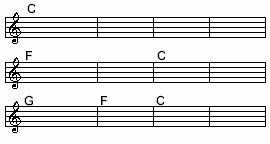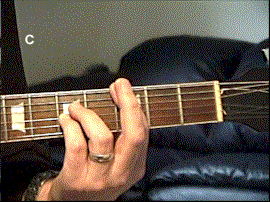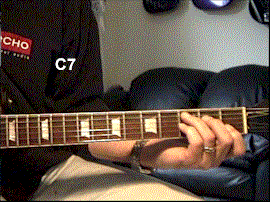Scroll through the lesson and click on notation/video/audio links to load the interactive players.
Please subscribe to get full access to all lessons for only $7.95/month PLUS 1 week free trial.

Riff Interactive lessons are
LESS expensive and
MORE interactive than alternatives!
More Info
|
|

Jam
Sessions - All Blues Styles
Lesson 8 - Blues in C
Lesson Sample
Lyle:
This blues jam is in a modern blues style. It stills follows the same 12 bar
blues progression. You'll be jamming in C. Here's the chord chart and your jam
track:
chord
chart

Jam Track - Blues in C
Lyle: You'll learn several ways to play rhythm to
this blues jam. First, here's the power chords used for the main rhythm
riff:
chords
chords

Lyle: Simple enough for these 3
chords!
Lyle: For a tight and powerful sounding rhythm,
select the bridge pickup and high gain on the amp. Turn the bass up, mids down,
and treble up on the amp tone controls. Don't use effects like reverb or delay.
Here's the full rhythm riff using the power chords:
crunch
rhythm
crunch
rhythm
BigTX: sounds
like funk!
Lyle: It does have a funky rhythm to
it.
Lyle:
It may look strange in the TAB, but the first accent is an up stroke right
before each new measure starts. ^ v ^ v. Lyle: Here's another rhythm riff for this jam.
The funky rhythm riff you hear all the way through is just this little riff
repeating itself:
clean funk rhythm riff
clean funk
rhythm
Lyle:
For this funky blues rhythm riff, use a clean amp setting and a single coil
pickup either bridge or middle or both.
Lyle: Now you have two different rhythm riffs you
can play as you jam along to the looping jam track.
Lyle: I'll show you another rhythm
riff using Dominant 7 chords.
dominant chords
dominant
chords

Lyle: Now try this way of playing the 7th chords
with the jam track.
arpeggio rhythm riff
arpeggio rhythm
riff
troy: Sounds
CCR-ish.
Lyle: Good ear!
troy:
:-)
Lyle:
There, I just showed you three ways to play rhythm against this 12 bar blues in
C. You probably can make up other ways
too.
Lyle: Now, on to soloing against this blues
jam.
Lyle: Since the progression is in C major and C
dominant 7, a good choice of scales to use when improvising is the C Mjaor
Pentatonic. Here's a simple and cool pattern for it:
C Major
Pentatonic
Lyle:
Playback the TAB so it displays on the virtual neck. It's a good idea to
visualize the pattern.
Lyle: Notice this is not a minor jam, but a jam
built from plain major chords. I like to use the major pentatonic scale to solo
with over most of it, then switch to the minor pentatonic during the "4" chord,
in this case, the F chord. Try learning this pattern for the C Minor
Pentatonic:
C
Minor Pentatonic
Lyle:
Here's a solo example of all this. You'll be using those two different
pentatonic patterns. The Major pentatonic during the C and G chords, the Minor
Pentatonic during the F chord.
solo
solo
Lyle:
How's that working for you, getting bluesy out there?
Tall:
Sounds great to me
PaulB: I'm on a metal distortion effect, rockin'
out
Lyle:
Back in Slow Blues in C - Lesson 6 there is a solo that can fit against this jam
track.
Lyle: You can steal the licks from that solo and
put them in this one. Here's a video example of me playing the solo from Lesson
6 against this jam track:
solo 2 sample
Lyle:
You can also use the matching dominant scale for each
chord:
C
Mixolydian
Lyle:
Use the C Mixolydian against the C chord, then change to F Mixolydian against
the F chord:
F
Mixolydian
Lyle:
Move the F mixolydian up two frets to get the G mixolydian. Use the G Mixolydian
against the G chord:
G Mixolydian
Lyle:
Practice playing up and down the scale patterns and changing for each
chord.
Lyle: Here's a video
example:
Mixolydian example
Lyle: I
can almost hear you jammin from here!
BigTX: Any suggestions on effects
pedals?
Lyle: If you want to get your first effects pedal
start with the wha wha / Cry Baby
pedal.
Lyle: Time to take a break. Thanks for coming and
good to see you all again at the next jam!
|
<< load notation from left
|
|
<< load audio from left
|
<< load audio from left
|